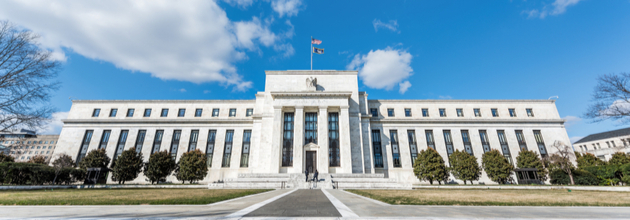 | Read in Browser |
 |
 |
| | Top News  Shutterstock The recent market decline is picking up some steam, with the majority of Fed officials signaling that the central bank could start dialing back on pandemic stimulus programs. That's according to minutes from the July meeting of the FOMC, which said a move to pare $80B/month in Treasuries and $40B/month of mortgage securities could happen this year. While there's still debate regarding the timing and pace, officials said tapering would not necessarily mean an imminent rate increase. Movement: U.S. stock futures slid another 1% overnight on the news, after the major averages closed 1% lower on Wednesday. Things don't look better in Europe, where the Euro Stoxx 50 fell over 2%, or in Asia, where the Hang Seng closed down by the same amount. "While there is clearly support from some of the more hawkish officials for a relatively quick taper finishing early next year - leaving plenty of scope for rate hikes to potentially begin later in 2022 - the minutes also noted that 'several' officials thought that 'an earlier start to tapering could be accompanied by more gradual reductions in the purchase pace,'" wrote Andrew Hunter, senior U.S. economist at Capital Economics. "On balance, we still expect the run-down to last 9 months which, if it began within the next few months, would point to a mid-2022 end-date." Go deeper: Don't think the focus on the Fed is going to let up anytime soon. While the next meeting of the FOMC will occur on September 21-22, Fed Chair Jay Powell is scheduled to speak at Jackson Hole next week. The annual economic symposium could provide some color on his thinking about tapering, as well as managing the aftermath of the coronavirus pandemic. ( 12 comments) | | Covid Statement from the U.S. Department of Health and Human Services: "We are prepared to offer booster shots for all Americans beginning the week of September 20 and starting 8 months after an individual's second dose [of a Pfizer ( PFE) or Moderna ( MRNA) vaccine]... We also anticipate booster shots will likely be needed for people who received the Johnson & Johnson ( JNJ) vaccine... We want to emphasize the ongoing urgency of vaccinating the unvaccinated in the U.S. and around the world. Nearly all the cases of severe disease, hospitalization, and death continue to occur among those not yet vaccinated at all." Those signed on to the declaration included heads of the CDC and FDA, as well as White House chief medical advisor Dr. Anthony Fauci, U.S. Surgeon General Dr. Vivek Murthy and Assistant Secretary for Health Dr. Rachel Levine. Data from Israel: Back in January, Israel struck a vaccines-for-data deal with Pfizer that promised to share vast troves of information from its highly digitized healthcare system in exchange for the continued flow of COVID-19 shots. Last month, the country's health ministry became one of the first in the world to formally recommend booster shots for older adults and to those with weak immune systems. On Wednesday, Maccabi Healthcare Services, Israel's second largest healthcare provider, also released fresh figures that suggested booster shots reduced the risk of infection in the 60-plus age group by 86% and against severe infection by 92%. Of the 105 Israelis who died of COVID in the last week, 103 were either not vaccinated or had not completed the immunization process. Outlook: "We have this expectation that COVID-19 had a start: It started in Wuhan, China, in December 2019. And we have this expectation that it is going to end," said Dr. Daniel Landsberger, chief physician of Maccabi Health Services. "We want a date for it to end." He went on to point out that pandemics are processes, until they run their course or drugs emerge that allow people to live with and manage the disease. "HIV has not ended," he added, pointing to the No. 1 cause of death among Americans (aged 25 to 44) in the 1990s. "We just don't call it an epidemic anymore. We relate to it differently." ( 242 comments) | | Sponsored By Voyager  Traditional banks loan out your capital and make roughly 10% on your money, giving you back a fraction of that yield. On average banks pay out less than 1% on your savings account). It doesn't have to be this way. In the crypto world, Voyager offers interest yields up to 12%, because we cut out the middle-man and give back to our customers. This generates a stable source of passive income, adds additional exposure to your crypto of choice, and makes your returns work even harder for you. Sign up with Voyager and use code ALPHA to get $50 in BTC when you deposit at least $100 and make your first trade. Beat your bank—invest with Voyager. | | Earnings Shares of the popular stock-trading app tumbled more than 7% in AH trading following its first earnings report as a public company. Robinhood Markets ( HOOD) reported a net loss of $502M, or a loss of $2.16 per share, though its revenue more than doubled in the second quarter thanks to a big surge in cryptocurrency trading. In fact, some 41% of the broker's total revenue came from revenue earned from crypto transactions, up from 17% last quarter. Notable fact: Dogecoin ( DOGE-USD) trades accounted for 62% of crypto revenues, as well as 25% of Robinhood's total net revenue of $565M in Q2. The reliance on Doge appears in a section of the company's 10-Q titled "Risks Related to Our Cryptocurrency Products and Services." It reads: "Business may be adversely affected, and growth in our net revenue earned from cryptocurrency transactions may slow or decline, if the markets for Dogecoin deteriorate or if the price of Dogecoin declines, including as a result of factors such as negative perceptions of Dogecoin or the increased availability of Dogecoin on other cryptocurrency trading platforms." Still going: The stock is off nearly 12% in premarket trade to $44/share. Besides the Doge dependency, Robinhood noted that seasonal headwinds and lower trading activity across the industry in Q3 would result in lower revenue and "considerably fewer new funded accounts." The company also expects to record a one-time charge of $1B in stock-based compensation for restricted stock units related to its IPO. In other highlights for the quarter, monthly active users increased 109% to 21.3M and transaction-based revenue rose 141% Y/Y to $451M, with options activity climbing 48% to $165M, cryptocurrencies at $233M vs. $5M a year earlier, and equities transaction-based revenue down 26% Y/Y to $52M. ( 31 comments) | | Global The VanEck Vectors Rare Earth/Strategic Metals ETF (REMX) has soared 3x as much as the benchmark SPDR S&P 500 Trust ETF (SPY) over a one-year time frame. And now, the fund could see a new catalyst from the Taliban's takeover of Afghanistan, which is rich in rare-earth metals. REMX aims to track the overall performance of stocks involved in producing, refining and recycling rare-earth and strategic minerals like cobalt, barite, lead, zinc and niobium.
Bigger picture: REMX has already been one of the market's top ETFs. The fund has a YTD performance of +54%, a one-year return of +137% and has yielded 95% over five years. To put that into perspective, REMX's performance is nearly triple SPY's +19% YTD gain and more than triple SPY's one-year performance of +31%. REMX is also one of the only pure-play ETFs to focus on rare-earth metals. It has $626M assets under management, an expense ratio of 0.59% and has witnessed over $367M of capital inflows YTD.
"It should be an international initiative to make sure that if any country is agreeing to exploit its minerals on behalf of the Taliban, to only do it under strict humanitarian conditions where human rights, and rights for women are preserved in the situation," said Ahmad Shah Katawazai, a former diplomat at the Afghan Embassy in Washington D.C.
What to watch: Afghanistan is estimated to have $1T to $3T of rare-earths and shares a 57-mile border with China. The latter is widely known as the world's dominant player in rare-earth metals (owning 35% of global reserves), and only hours after the Taliban overran the Afghan government, said it was ready for "friendly cooperation." Beijing has also been looking to play a constructive role in Afghanistan's peace and reconstruction process and previously threatened to cut off rare-earth supplies to the U.S. during the trade war in 2019. (42 comments)
| | Today's Markets In Asia, Japan -1.1%. Hong Kong -2.1%. China -0.6%. India closed.
In Europe, at midday, London -2%. Paris -2.4%. Frankfurt -1.8%.
Futures at 6:20, Dow -1.2%. S&P -1%. Nasdaq -0.8%. Crude -2.9% at $63.31. Gold +0.4% at $1790.90. Bitcoin -1.5% at $44697.
Ten-year Treasury Yield -4 bps to 1.23%
Today's Economic Calendar | | | | | Seeking Alpha's Wall Street Breakfast Podcast Seeking Alpha's Wall Street Breakfast podcast brings you all the news you need to know for your market day. Released by 8:00 AM ET each morning, it is a quick listen that you can put on as you get ready to start your working day. | | | | |











EmoticonEmoticon